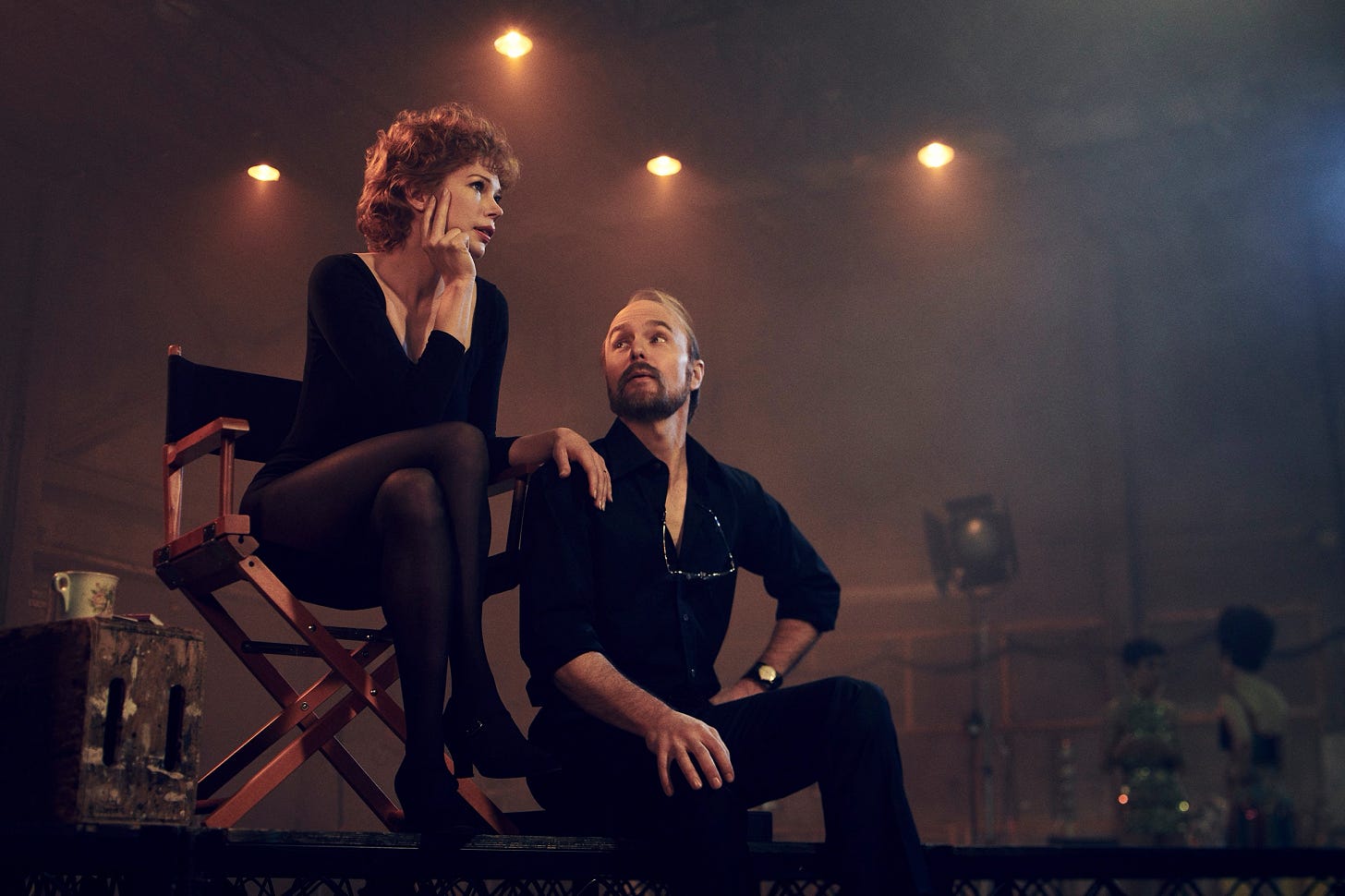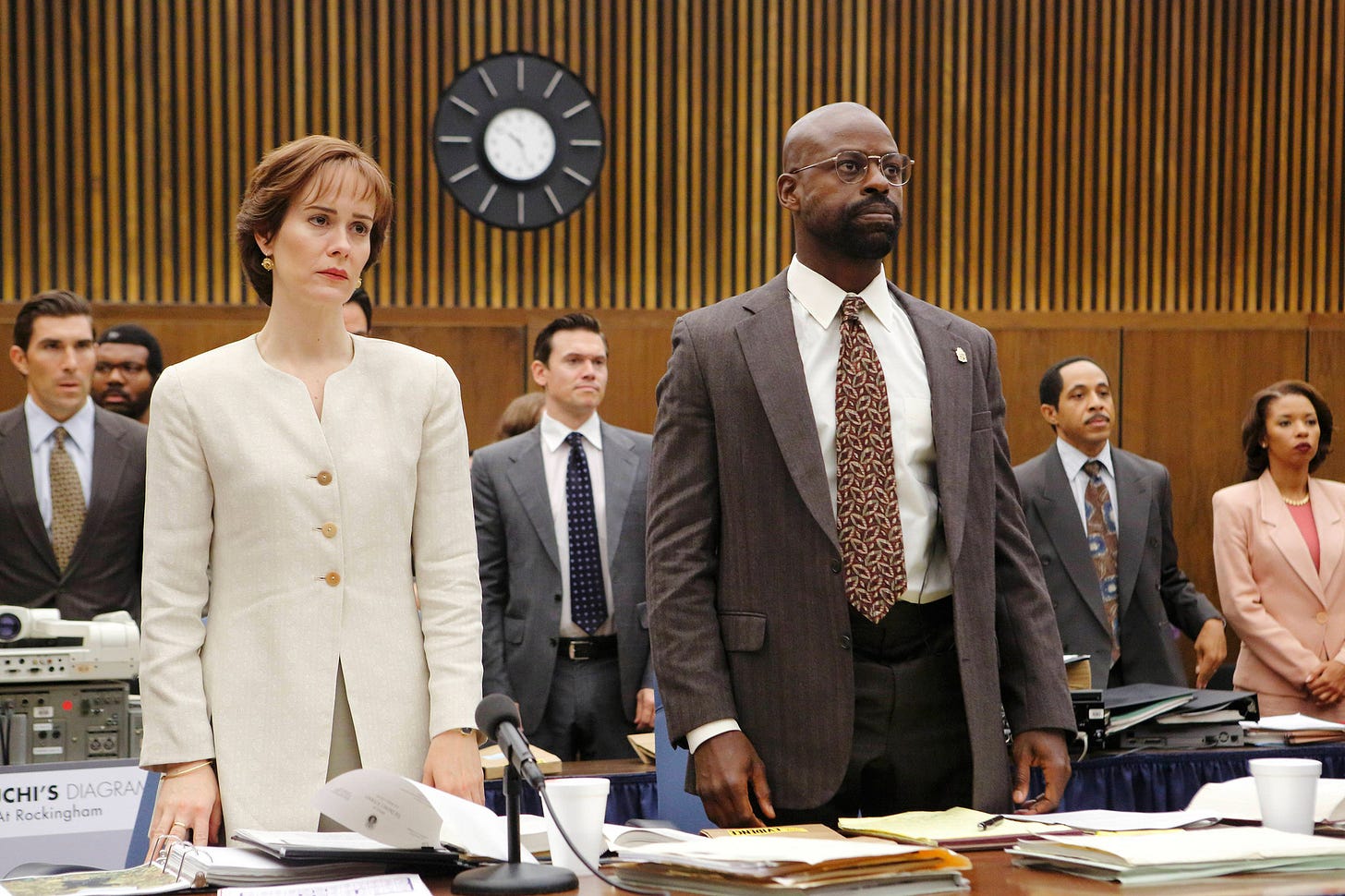It seems like you can’t swing a dead cat (or in my case, an alive one that insists on chewing on my new plants and has to be forcibly removed) in the television lineup without hitting a miniseries based on true events. They mostly fall into three camps: true crime; an examination of how we mistreated a famous woman in the past (usually the 90s); and/or the story of a scammer (usually of the Silicon Valley variety). This is because those three topics happen to be very popular in podcasting, and Hollywood will literally collapse if it’s not allowed to adapt something that worked on another medium, regardless of whether it’s a good fit for the screen. The things that are airing right now range from boring/embarrassing to somewhat amusing, but none of them have managed to really transport me or teach me anything new about the real events they speak of, so I thought I’d put out some good vibes into the universe by recommending shows that did.
Famous woman mistreated: Fosse/Verdon
The pitch: Come for the period costumes and sets (which are indeed top-notch), stay for a feminist take that (unlike other things in this category) resists preachiness.
Me gusta porque: This adaptation of Sam Wasson’s biography of director and choreographer Bob Fosse (of Cabaret and Chicago fame) is mostly written by Steven Levenson (of Dear Evan Hansen fame) and mostly directed by Thomas Kail (of Hamilton fame), as well as having big Lin-Manuel Miranda energy (and money). If you’re thinking “all of those things are a con for me!”—I hear you. I don’t give a shit about musical theater, much less musical theater that happened before I was born (though I don’t give a shit about a lot of things, to be fair). But the hook of the show is that it adds the “Vernon” to the equation, focusing not just on Fosse’s life and career, but also those of actress Gwen Verdon, Fosse’s second wife, muse, and arguably the love of his life. It’s in a way also a true-crime show—the crime being that she got lost in his shadow, something that the series endeavors to correct, chronicling her humiliations with a steely gaze. Most crucially, it does so without forgetting she was a complex person (something I have strong opinions about). Fosse, were he alive today, would have been canceled many times over, but Verdon is shown as having her own cancelable moments, either condoning reprehensible behavior or outright engaging in it to further her career. The show is at its best when it focuses less on the pizzazz (though there’s plenty of it) and name-checking musical theater giants (most of whom I had hitherto never heard of), and more on its interpretation of these larger-than-life figures who were saddled with the herculean task of continuing living their lives after the audience left the theater. In those moments, the writing (and Michelle Williams and Sam Rockwell’s acting) shine brighter than any Broadway marquee.
What a pretentious piece of shit closing line that was. I know! I got caught up in the spirit of the thing. I apologize.
Where? Hulu.
I’ve already watched it! Then watch My Week With Marilyn. It has a lot in common with Fosse/Verdon—most notably the fact that it also reexamines how we treated a woman from the past, as portrayed by Michelle Williams (who, while not as good as she is in Fosse/Verdon, still manages to put a personal spin on a legend). The movie is a tad too 2000s-Oscar-bait-y (probably because it was produced by you know who), but it does my favorite thing in a biopic: focusing on a single episode that illuminates the person as a whole (and, in this case, also makes Arthur Miller look real bad—not that he needed any help with that).
True crime: Our Boys
The pitch: a nuanced take on the Israel-Palestine conflict that doesn’t ask you to take sides, but refuses to gloss over the human toll of it.
Me gusta porque: a polished international production by HBO, this miniseries became highly controversial when it aired, with former Israeli Prime Minister Benjamin Netanyahu calling it outright antisemitic. It’s easy to see why: while the show starts in the aftermath of the kidnapping and murder of three Israeli teenagers attributed to Palestinian militants, it focuses on the subsequent kidnapping and murder of Mohammed Abu Khdeir by three Israeli citizens (two of them minors), leading to accusations that the show gives an unbalanced account of events. I respectfully disagree: at no point did the violence on screen invite me to take a hard stance regarding the larger conflict. The characters, regardless of where they live or what their religion is, are all afraid and in pain. Even if they can’t (or won’t) articulate it in these words, they are exhausted by the conflict that’s a part of their daily lives but hasn’t managed to become normal. All they can do is cling to their version of events and hope it eventually becomes a reality: “Thank God Jews didn’t do this, take care,” texts the mother of the detective in charge of Mohammed’s case (an outstanding Shlomi Elkabetz), in a very funny and also kinda heartbreaking moment. Even in its hair-raising recreation of the murder, the show asks us not to reduce people—to their race, to their neighborhood, to their creed, or even to their actions, however brutal. As Avishai (one of the teenagers convicted of the crime) tells us, to do so would be to judge something by its end—and who knows how much information we’ll miss if we skip straight to the end?
Okay, that line was a little better, but I have to watch the show to understand it. Maybe I did that on purpose! Have you considered that?
Where? HBO Max.
I’ve already watched it! Then watch another polished international HBO production, Patria, which was also controversial in its home country, Spain. The crime at its core (the murder of a businessman by a guerrilla fighter, and its effect on both their families, who go from friends to mortal enemies) is not true; the show is based on a novel of the same name by Fernando Aramburu. But the conflict in which it’s grounded, which saw Basque separatists face off against Spain’s armed forces, was a painful reality—one that haunts the Spanish and Basque people to this day. While not as skilled as Our Boys at letting its point surface organically (there are a couple of moments that hammer it in), the show really invests in its characters (as do the actors that portray them) and it makes the whole journey worth it.
Hors concours: The People Vs. O.J. Simpson
The pitch: the miniseries that kickstarted this whole frenzy, and my favorite TV show of all time.
Me gusta porque: A few months ago I said that The People Vs. O.J. Simpson deserved its own newsletter, and this was almost it—my original idea for this week was a long essay to reflect on how the success of O.J. had engendered all these ripped-from-the-headlines copycats, and how Hollywood once again learned all the wrong lessons from a success. But I honestly didn’t have much to say other than that logline, and to go into detail would require me to name the offenders and catalog their faults; the two unspoken rules of this newsletter are that I a) don’t recommend things I haven’t seen (a lesson that now goes doubly after I recommended a play I had read and loved and then was rewritten before production to become… very not good) and b) don’t trash-talk things by name. SO instead I decided to focus on the success cases, and O.J. is THEE success case of the miniseries that revisits famous events. It does what so many of its offspring fail to do: has a take. In this case, it reframes the murder of Nicole Brown and Ron Goldman not around whether O.J. did it but around the clash of the feminist and Civil Rights movements, as personified by prosecutor Marcia Clark and defense attorney Johnnie Cochran. With Clark, played by Sarah Paulson doing perhaps the best acting of her career, the show attempts to also examine how we mistreated a famous woman in the 90s, and the writing sometimes glosses over some of the (in my opinion, understandable, or at least just human) flaws of the real-life Clark—who got a standing ovation at the Emmys as Paulson’s date for the evening (cringe, as the kids would say). But it does hone into her (at least according to the show) racial blindspots and belligerence, even as it asks you to root for her—and it’s impossible not to feel her despair as her supposedly bulletproof case collapses in front of the entire country, who can’t take their eyes off the TV. For Cochran, in a delicious performance by Courtney B. Vance, the show saves its savviest writing: he manages to come across as both an ice-cold, take-no-prisoners lawyer, and a committed, caring advocate. If Clark’s fatal flaw was not accounting for just how racist the LAPD could be, the show posits, Cochran’s was thinking that the O.J. trial would be a landmark civil rights case. As Chris Darden (a tragic figure embodied perfectly by Sterling K. Brown) points out, the only person affected by the verdict is Cochran’s “rich client in Brentwood.” I have watched this show countless times now, and it never gets easier getting to that ending. Sure, it’s not perfect—Ryan Murphy’s involvement midway through (that’s how the show became American Crime Story Season 1) probably accounts for all the dramatic zoom-ins and its obsession with the Kardashians, but no show that came after it has been able to match this level of craft or justify its existence as well as O.J. A revisiting of the past should do more than rehash old news clips. It should say something new, something that all the archival footage put together can’t. Otherwise, why bother?
Where? Hulu (make sure to select Season 1).
Wait, what about a show about real-life scammers? You didn’t recommend one. Well, this is a show about scamming if you consider that… O.J. scammed… the justice system? No, nevermind, I can’t make this work. I just don’t like any shows about scammers well enough to recommend them.
A movie about real-life scammers, then? Oh, yeah! Catch Me If You Can. It’s full of little delights, like Christopher Walken talking about mice swimming in butter, Amy Adams wearing braces, and Leo DiCaprio not annoying me. Someone will 100% make this into a TV show soon and ruin it, so catch it if while you can.
That was awful. Listen, you come up with good jokes every two weeks while working on three different projects and then get back to me, okay?





